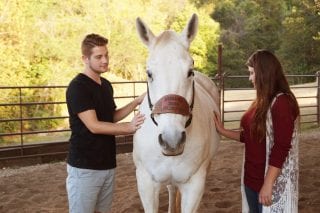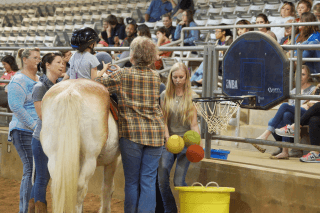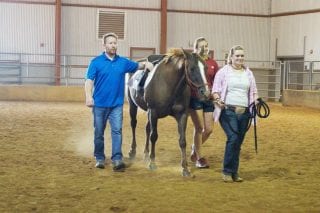Did you know that horse can be great therapeutic partner? Have you heard about Equine Assisted Activities and Therapies (EAAT)? The University of Arkansas Animal Science Department provides documented evidence […]
Did you know that horse can be great therapeutic partner? Have you heard about Equine Assisted Activities and Therapies (EAAT)? The University of Arkansas Animal Science Department provides documented evidence of the benefits of horse-human interactions through this form of experiential therapy. Since 2014, Dr. Kathi Jogan, instructor at ANSC Department at the U of A, has brought in students from different disciplines to witness the advantage of EAAT for individuals with emotional and physical disabilities. More interestingly, taking it to the next level, Dr. Jogan integrates service learning into her course and finds double benefits. EAAT not only promotes behavioral health for individuals with emotional and physical disabilities being treated but also helps build students’ character through volunteerism.
Read more to know what Dr. Jogan says about the benefits of embedding service learning into EAAT course.
Why EAAT?
Equine Assisted Activities and Therapy (EAAT) is a growing field of study and is of interest to Animal Science students as well as students in the Social Work, Psychology and the Education fields.
Each fall, the University of Arkansas Animal Science Department offers undergraduate students from many disciplines across campus EAAT course taught at Whitaker Animal Science Center for a 3 hour block of time. This class allows students to gain an understanding of what makes EAAT effective by studying how the different client bases served, what makes animals good partners in therapeutic settings, the different types of equine assisted therapies practiced and industry standards for licensure.
No horse handling experience is necessary. Classes in safe horse handling and volunteer training will take place in preparation for the service learning component. Guest lectures and demonstrations featured will be presented by a Psychologist at the VA whose specialty is PTSD, licensed Social Workers who utilize horses in a variety of therapeutic settings, PATH and EAGALA certified instructors and individuals currently practicing equine assisted therapy in our region.
How Is Service Learning Integrated into the Course?
This interdisciplinary course is enriched by a service learning component that integrates instruction with meaningful community service. During hands-on demonstrations, the concepts introduced in lecture will be reinforced, and different therapies utilizing horses will be explored. In this way, students would practice what they learn and see the benefit of EAAT.
Students volunteer at local non-profit EAAT agencies such as Horses for Healing and Courage, Inc. They not only apply their new skills but also observe, first-hand, the many benefits EAAT has to offer individuals who have physical or emotional disabilities. The service learning component of the EAAT class is integral because this applied experience ‘pulls everything together’ and allows students to see the therapeutic value of EAAT.
How Do Students Benefit from this Service Learning Course?
End of course evaluations always rate the service learning portion of this course such as through interaction with the agencies and opportunities to lead an EAAT trained horse for a therapy session as “eye-opening”, “life-changing” and “transformational”.
Also, based on her research last fall with a Nursing School colleague Dr. Kelly Vowell-Johnson, they found positive impact of service learning on student’s confidence, concern and volunteerism. Funded by Wilma Sacke-Mattie Cal Maxted Grant, they examined service learning embedded into the EAAT course, and the effect this class had on confidence, concern and volunteerism in undergraduates. The primary goal of this IRB-approved study was to assess how exposure to and participation in an EAAT course affected student’s confidence, concern, and propensity to volunteer. A service learning component associated with the course offered students the opportunity to work with individuals with disabilities for a minimum of 15 hours throughout the semester.
A convenience sample of 36 students completed a pre and post assessment utilizing the Bales Volunteerism-Activism Scale and a confidence and concern assessment, which yielded these results: (1) self-confidence of class members working with people with disabilities significantly increased, (2) motivation to volunteer remained constant, and (3) there was no difference in concern regarding working with people who have disabilities.
The results of her research were presented at the CARE Conference, a juried, national research conference that offers opportunities to connect service learning initiatives with research, this year. These will be analyzed further, and an article submitted for publication to the Journal of behavioral and Social Science.
Dr. Kathi Jogan is instructor at ANSC Department at the University of Arkansas. This spring, with funding through the Service Learning Travel Grant, she traveled to the Conference on Academic Research in Education (CARE) in Las Vegas, Nevada to present her paper “Affecting Confidence and Concern of Undergraduate Students and Increasing Volunteerism to Support People with Disabilities.” This conference was held in conjunction with the American Association of Behavioral and Social Sciences Conference as well as the Ethnographic and Qualitative Research Conference.



